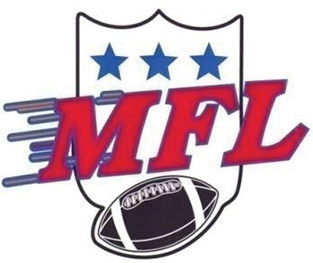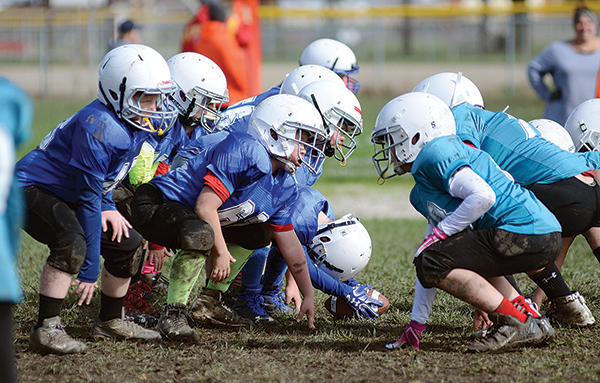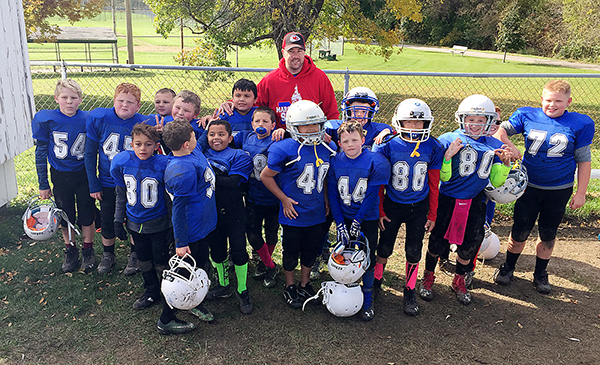MFL celebrates 50 years
Marshalltown’s youth football league reaches half-century mark this fall

To reach 50 years for any non-profit organization is a big achievement. For the Marshalltown Football League (MFL), the journey to 50 years of business — which will be made official when the 2022 season begins — started with the hard work of a group of families in Marshalltown including the Eaton family, and the vision of Dr. Michael Kremer.
On September 2, when the Marshalltown High School football team hosts Waterloo East, the group of founders and former commissioners will be honored and recognized by MHS to honor the organization’s half-century of operation.
MHS Athletics Director Ryan Isgrig said the school was happy to bring a light to the moment.
The beginnings of the league can be traced back to 1972 and the arrival of Dr. Kremer in Marshalltown as an elementary school teacher. Dr. Kremer said he noticed there was not much in the way of youth football structure in the town, and as a former college football player at the University of Jamestown in North Dakota, he felt there was room for Marshalltown to give youth football a chance.
With the help of numerous families — including Nona and Darrell Eaton, Chuck and Dorothy Kilstrom, John and Susan Hass, Denny and Cookie Ritland, and Randy Bloom — the Marshalltown Football League came together in time for the 1973 fall sports season. A frenzied, all-hands-on-deck exploit, Kremer said the efforts made by everyone involved were extraordinary.

T-R FILE PHOTO - Third-and fourth-grade teams from Marshalltown, left, and North Tama line up across from each other at the line of scrimmage during a Marshalltown Football League game on Oct. 13, 2018. The Marshalltown Football League is celebrating its 50th year this season with events to honor its founders.
“For me, it will be a larger honor to be a part of the ceremony and think about the other board members and their wives than me,” Kremer said. “It will make this experience one of the best experiences I’ve had in my lifetime.
“I played a small piece in getting this job done, the others were up to their elbows locating the right people with the right jobs done at the right time.”
Everything the MFL used came from donations or from the group of families starting the league — the goalposts were welded by Darrell Eaton with help from his sons Monte and Mark, they were doing their own mowing of the football field (which was located where the current 6th Street Softball Complex is), all of the groundskeeping and field painting as well as running their own concession stand from a trailer provided by the Ritland family.
There was no outside help from investors and no fee charged to the families of the young athletes taking part — it was provided free of charge for members of the community in grades 3-6. Easy access was key to the enterprise taking off, Kremer said.
The first season was held without a slow build-up. There were more than 700 kids from Marshalltown who took part in the first year, according to Monte Eaton, playing flag football with a rotating cast of coaches and high school referees overseeing the games. Members of the board went around with baskets asking for cash donations during timeouts. It was not without its bumps in the road early on, but there was clear success and a foundation being formed. Bumps were ironed out as soon as they happened, on the fly, not at the end of the year, Kremer said.

T-R FILE PHOTO - Former MFL commissioner Travis Englund poses with his third-and-fourth-grade football team after their game Oct. 13, 2018.
The MFL had to move its field slightly to accommodate the softball fields complex, but there was no slowing down its growth.
Monte Eaton described how teams were selected and how the 700 young Marshalltown athletes were divided up in the early years. He added that the group aspect of it was huge, especially as an athlete early on when learning how to play the game.
“I met a lot of people and learned a lot of stuff,” Monte said. “It was more about participation and getting along with people you didn’t know and getting to meet people you didn’t know. You had no idea whose team you were going to be on, you didn’t get picked — it was just a blind draw.”
In the late 70s, there were as many as 700 athletes participating in the MFL, buying into the flag-football league and given the opportunity to learn whether or not they wanted to continue playing the sport in middle school or high school.
One of the keys early on was the wait on tackle football, with Kremer pushing for that because of the hesitancy to introduce contact so early on.
“At that time the football coaches as well as myself had a strong feeling that young people should not start learning or gaining appreciation for the sport through anything but flag football,” Kremer said. “I’ve watched too many kids get burned out through that process [playing tackle football early] and I was one of those who had many concussions while playing football.
“The program was trying to make everyone feel like a star and love the game, and come back and play it again.”
As the years carried on and the league grew in its early state, a sense of community and family-like atmosphere was furnished among the original board and those who helped make the program run. Monte, who played in the first two years of the league and was around the MFL early and often given his parents’ involvement as board members and co-founders, said there were numerous positives to taking part in the league.
One of the funnier asides from the early years were his matchups with older brother Mark, as their parents put them on different teams in the fifth-and-sixth grade level.
Early teams in the MFL were named after NFL teams and were given uniforms and helmets similar in style to those of their professional counterparts. Monte was on the Kansas City Chiefs, while Mark was on the Detroit Lions.
They met up in the championship — forcing the Eatons to cheer for both teams throughout the game the Chiefs won. At that time, the winning team in the MFL was given a prize of an overnight trip to a real NFL game. The team Monte and his team got to watch? Kansas City, of course.
Monte said the games and the experiences the league presented for young athletes was important, but he adds that over the years he’s realized another important lesson the MFL was meant to teach.
“You only get out what you put into it,” Monte said. “I think that [the] MFL is a great program and could use all of the community’s support it can get. I played in the MFL, coached both my sons who also played in MFL, my oldest played through high school and youngest son now plays for the Bobcats. I sat on the MFL board for many years and now assist on an as needed basis. It is unbelievable it has been 50 years.”
In 1981, Kremer moved on from his positions at Fisher Elementary School and took up a job as the assistant superintendent in Marshalltown. It meant after nine years of being involved with the MFL and its creation/early success, he stepped aside and moved on from the league. He said when he left that he trusted the league to continue to grow and flourish — explaining that all of the creators of the league saw it the same way, looking towards the future as much as they were engaged in the present.
“Our goal was to ensure that the program and the vision would remain in the community,” Kremer said. “That was our goal, to pass the baton to a group of committed individuals that would not just maintain the program but improve the quality of the program over time.
“We could no more than hope that the next group of people would continue the quality of the program.”
Since his exit in 1981, the MFL has had its share of ups and downs — and Monte has been involved in some capacity or another with the league through every stage of its existence as a player, a coach, a board member and now in an advisory role. He said it’s a very important program that has stood the test of time and needs as much help from the community as possible to grow.
Former and current commissioners of the league throughout its 50 years made the same point.
Nick Loney, the commissioner of the MFL from 2013-2016 and a player in the 1980s when it was still solely a flag football league, looked back fondly on his formative years as a third-through-sixth grader. Loney made clear how important the experience was to his football career in middle school and high school.
“Some of my best memories growing up were playing MFL,” Loney said. “It was all Marshalltown and it was flag football. There were almost 1,000 kids, all from Marshalltown. I remember my coaches and the impact they had on me as a kid.”
When Loney settled down with his family and his sons became of age to play in the MFL, he knew he wanted to be involved. As his involvement grew in the late 2000 from a coach to a board member, he noticed some changes to the league — one of them including the implementation of tackle football from first grade through sixth grade. After assuming the role of commissioner, the concern over concussions and long-lasting head injuries was starting to step into the mainstream.
During this period, Loney said he felt it was important to move the league in a direction of safety. He made sure a trainer was present each of the six weekends and re-introduced flag football in the lower grades — endeavoring to provide an introduction to the game before integrating tackle and potentially scaring off some young athletes.
During this period the MFL was strong, but Loney shed some light on the sheer amount of work done behind the scenes to keep the league running as smoothly as can be done.
“It was a year-round job, you’re planning for next season, updating equipment and cleaning equipment,” Loney said. “I think we had 10 different communities that came up and there were a whole bunch of communities that came up to Marshalltown to play football.
“When kids got to play football on Saturday morning, it was all worth it.”
Loney isn’t involved in the MFL anymore, but he said he still checks in on it and thinks it’s an important piece of the community.
It’s a sentiment confirmed with the most recent commissioner to step aside, Travis Englund.
Englund was the commissioner in 2019-2020 and navigated the league through the fall of the COVID-19 pandemic, when there were ample concerns over whether there could even be an MFL season.
All avenues were explored, Englund said, and he felt it was too important to not give interested kids an opportunity to play.
“We looked up to some of the bigger leagues to see how they ran things,” Englund said. “With the kids having been stuck inside for their whole year of school, having that summer where they weren’t able to get out, everyone was anxious to get outside. There was a lot of talk of not having a season, about if we just weren’t able to do it. But then I thought about those kids who were in their sixth-grade year and it’s their last year to do MFL before going on to middle school.
“To have them miss out on that, I would have found it heartbreaking.”
As is the case with most commissioners and board members, once their kids advance past sixth grade and on to middle school they step down and allow new blood to come in.
After Englund came the current commissioner, Tim Holmgren. Holmgren has spent the past two seasons wrapping himself into the role and trying to build MFL back up after a difficult decade for the league. The loss of one of the more involved schools in the league — West Marshall — is difficult, but Holmgren said the expectation is that involvement will be increased this season from 2021 numbers. With flag football numbers fluctuating, the league will provide the option but will also offer tackle football for all age groups.
School districts like Meskwaki and GMG continue to contribute to the league by involving their players and coaches, while schools as far away as Lynnville-Sully still play in the league on a weekly basis — bringing good-sized crowds and more business to Marshalltown restaurants as a result, Holmgren said.
The 2022 season is going to be an important one for the league, and Holmgren said it’s important to invest to put the league on a different trajectory.
“We’re hoping to put investment into the facilities like the irrigation system, because a big part of our game is the fields,” Holmgren said. “We’ve been lucky this summer to have volunteers to help take care of the fields, water and move [sprinklers] multiple times a day.”
Getting more involved the past 12 months has been an important point of emphasis for Bobcats head coach Adam Goodvin, as he provides the MFL with fundamentals and concepts he wants them to introduce before the young players reach middle school and high school.
“It’s important as the head coach to get involved down there because that’s where it all starts,” Goodvin said. “Getting our kids introduced to the game and learning the basics is important.
“We try to give a lot information down to the coaches at the MFL, it’s a lot of the basics including what we do scheme-wise too so those kids can leave at the end of the year learning something about what we do at the high school.”
Still a non-profit, the MFL has continued to try and raise money from the community to upgrade facilities, order new equipment and continue promoting the product.
One of its fundraising drives is coming up on Aug. 19, two weeks before the 50th anniversary of the league is recognized. The MFL will hold a meat drive sponsored by JBS, which has provided various pork products that will be offered up in the school parking lot prior to the Marshalltown High School football intrasquad scrimmage. Holmgren said the organization is always looking for more volunteers and is open to anyone looking to help the season run smoothly.
There have been lots of ups and some very real down times as well for the MFL throughout its 50-year history — but the people who have been a part of the league say it remains an important entity for the community and for the Marshalltown football scene.
- T-R FILE PHOTO – Third-and fourth-grade teams from Marshalltown, left, and North Tama line up across from each other at the line of scrimmage during a Marshalltown Football League game on Oct. 13, 2018. The Marshalltown Football League is celebrating its 50th year this season with events to honor its founders.
- T-R FILE PHOTO – Former MFL commissioner Travis Englund poses with his third-and-fourth-grade football team after their game Oct. 13, 2018.






